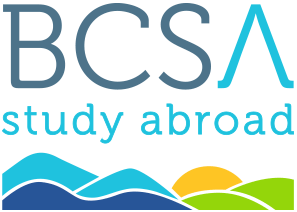Financial AID
BC Study Abroad Scholarships
Eligibility
The BC Study Abroad Scholarships celebrate the study abroad experience through student-generated content and financial support. Scholarship recipients will receive $500 for a virtual study abroad program and $1000 for an in-person study abroad program, and the opportunity to share their in-person and/or virtual exchange study abroad experience via blog and photos.
Applications for the Winter 2026 scholarship are now closed. Please check back in Fall 2026 for the next application period.
To be eligible for the BC Study Abroad Scholarships, applying students must meet the following criteria:
- Be currently enrolled at an active BC Study Abroad Consortium Institution.
- Enrolled in or accepted into a short-term in-person or virtual study abroad program.
Expectations
For In-Person Programs ($1,000)
- During the program: Submit a 300-400 word blog post with photos.
- Within 60 days of completion: Submit a second 300-400 word blog post with photos.
- Submit 8-10 high-resolution photos (at least 150 dpi) documenting your experience, accompanied by a document with:
- Image file names;
- Captions;
- Locations.
- Present your experience at your home institution, once back in BC.
For Virtual Programs ($500)
- During the program: Submit a 300-400 word blog post with a screenshot or photo/video illustrating your learning.
- Upon completion: Submit a second 300-400 word blog post with a screenshot or photo/video.
- Submit 5-6 screenshots/photos/videos (150 dpi) capturing your virtual exchange, with file names and captions.
How to Apply
Content Use
Prepare the following:
- Transcript from your home institution (unofficial or official).
- Confirmation letter of program acceptance from the host institution.
Note: If you do not have your official acceptance letter at the time of application, please submit your nomination letter instead and provide the official letter to us as soon as it becomes available. - Reference letter from a staff/faculty member at your home institution supporting your study abroad application, describing your dedication and aptitude for intercultural work.
- 300-500 word essay answering:
- Why are you applying for the BCSA scholarship?
- What do you hope to learn from your study abroad program?
- How will you share your knowledge after completing the program?
- A writing sample (1-5 pages, e.g., blog post, creative writing, essay).
- Applications for the Winter 2026 scholarship are now closed. Please check back in Fall 2026 for the next application period.
- If you have any questions or comments, please email info@bcstudyabroad.ca
Diversity Statement
BCCIE is committed to an inclusive learning environment that reflects the richness of the community that we serve. BCCIE welcomes applications from all qualified individuals, including Indigenous peoples, people of colour, people with disabilities, and all groups protected by the BC Human Rights Code.
BC Study Abroad and the BC Study Abroad Scholarships are administered by the British Columbia Council for International Education (BCCIE) on behalf of the BC Study Abroad Consortium.
Funding Resources
- BC Student Loan Services
- The British Columbia Scholarship Society offers various scholarships for international exchange.
- The Government of Canada offers various scholarship funds primarily for graduate students with some for undergraduate students.
Student Loans
You may be eligible to apply for student loans to support your study abroad experience. Ask a financial advisor at your home institution for further information on student loans.
Budgeting Tips
Are You a BC Educator?
Studying abroad is life-changing for students, and we’re here to help. Access resources that make international study more accessible and impactful.
Already a Member?
Promote your institutions study abroad programs and contribute to best practices in international education. Help students access meaningful global opportunities.
